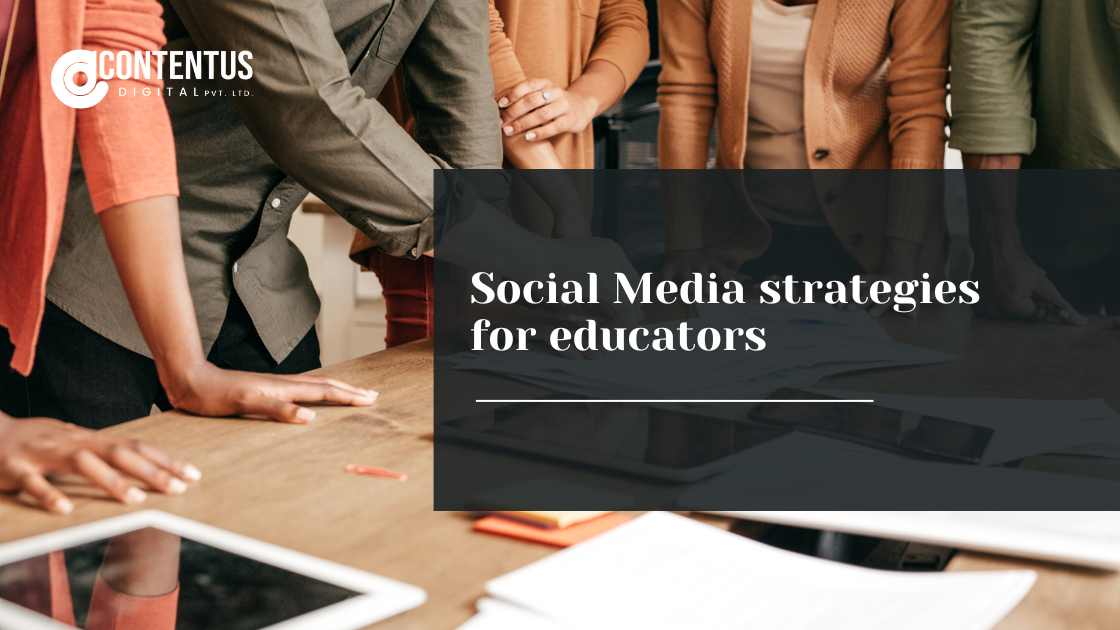Social Media strategies for educators
Table of content
1 | Introduction |
2 | Effective social media strategies for educators |
3 | Conclusion |
Social media platforms have revolutionised the way we communicate with each other. Now, these platforms are not limited to just personal usage, they are parallelly useful for education, professional communication, marketing, advertisement, and more. So, as an educator, you must utilise the power of social media platforms for the sake of your students. By using effective social media strategies, you can enable remote education opportunities for them.
Now, a lot of educators have been experiencing the advantages of integrating social media channels for their teaching purposes. Social media not only makes education easily accessible for students but also provides facilities like boosting engagement, collaboration, creativity, critical thinking, and more. That means it helps you to establish your identity as a potential educator and provides various privileges for the students. Thus, in this blog, you will learn about some helpful social media for educators strategies and best practices.
Source
Effective social media strategies for educators
- Live lectures and discussions
Online lectures and discussions encourage the students to learn interactively. They can access these resources independently from their devices remotely. So, they don’t need to bother about travelling to school/university and joining the class. Instead, they can join in the lecture from their home, take notes, ask questions and give reviews.
Again the live captions help the students with hearing impairments and the non-native speakers. So, you can include social media planning for teaching through YouTube Live, Instagram Live, LinkedIn Live or Facebook groups. These live streams and discussions help you to reach a wider audience from different institutes across the globe. Even the teachers, professors and scholars gain access to your lectures.
- Build a powerful community
If you conduct virtual classes and have students or alumni in other countries, then building a strong online community is mandatory. You can create a niche-specific Facebook page or group to engage and encourage more students for their education. Within those pages and groups, they can discuss courses, share their learning experiences, and post questions and comments.
Moreover, these communities help them to connect with teachers, professors, and mentors. So, this strategy becomes helpful for both the regular and the home-schooling students.
- Attract new students through the campaign
The social media campaign is a powerful strategy to drive students to your school, course, or online classes. For instance, if you want more student enrollment in your next online course, simply you have to tell them the facilities you’re providing for them through this course. So, you can mention your teaching techniques and offer discounts for early sign-up and course duration. Furthermore, add an urgency trait to your course campaign. So, you can use the phrases like ‘70% of seats has been sold out’ or ‘only 10 seats are left’, etc.
Here, you can take an example from MasterClass. They promote their online courses by creating some enticing reels. In these reels, they mention how and why their courses become helpful for the students.
- Broadcast alerts and updates
Educational institutes use several software for maintaining internal communication with their students, but they might not be aware of the platform X (previously Twitter). Nowadays, X has become popular among students and teachers for its user-friendly interface and faster speed. So, you should use X for creating real-time updates and alerts for the students. It’s easier for the students to access this platform through their devices.
So, you can create a single handle for every class and reuse these handles in the upcoming year. But if you prefer to create new handles every year, that’s up to you! Additionally, you can use the threads of X for sharing tips, tricks, interesting facts, or quizzes for the students.
Even you and your students can follow a few hashtags to acquire the latest news and updates about specific topics. It helps you to gain updates about the topics you have discussed in the class and side by side it makes you aware of the social trends.
- Encourage blogging
Blogs have been started in the early 90s and these have evolved as marketing tools. Now, educators and students have benefited from blogging. Here is how blogging can help them –
- Teachers should encourage the students to create personal blogs on what they have learnt from a particular class. They can share their thoughts and opinions about a subject and ask others to comment on their blogs.
- Furthermore, blogging is a good strategy for improving the writing skills of students. Thus, educators should encourage them to write about different topics and niches.
In this way, the educators experience higher student engagement. So, when you ask the students to submit a blog, they feel motivated to do their task and come with several creative ideas. So, blogging becomes a rational strategy for developing students’ confidence.
- Participate in Quora discussions
Are you looking to boost the critical thinking capabilities of your students? Then Quora is the best platform through which you can create discussion challenges for your students. You can post questions related to the lessons and ask the students to provide answers or post their opinions. It will not only boost their discussion skills, but also promote their critical thinking.
Again, you can add a constraint by mentioning the word limits of the answers. In this way, they can develop skills about how to answer precisely without wasting additional words.
Thus, participation in Quora discussions is one of the best social media strategies for educators. Also, by implementing this strategy you boost your visibility to the other students, educators, and mentors outside your organization.
- Use YouTube for presenting visual study material
YouTube is the best video streaming platform where anyone can access a plethora of free valuable video resources. From this platform, the students get video-study materials from experts across the globe. According to a recent study, 50% of users of this platform prefer it for content consumption for educational purposes.
So, you must include YouTube in your social media growth strategy. You can upload informative videos about several topics for your students. Again they can share their presentations on YouTube so that anyone across the globe can access these videos and share their opinion. In this way, they feel motivated by their tasks and keep themselves ahead of the competition. Also to boost productivity there are outstanding tools that are amazing the tools like duration analyzer, helps in calculate and analyze the duration of any playlist.
Additionally, you can use YouTube Live for hosting your live lectures. YouTube Live is the number 1 medium to watch live content. So, don’t forget to put it within your social media marketing strategies for education. Also for accessing them offline and enjoy uninterrupted study sessions students can use multi downloader for free and lightning speed results.
- Teach thought leadership and networking skills
The professional world is becoming more competitive day by day. So, you should teach your students about developing strong networking and thought leadership skills.
LinkedIn is the best platform for building professional connections. This platform also helps the students to build potential connections for their professional lives after high school. Also, this platform provides the same facilities for the home-schooled students.
So, you can teach them about how to build and maintain relationships, identify potential educators and mentors, and build their brands. For this purpose, you can share workshop opportunities with the students. These workshops provide them valuable opportunities to join a potential network, develop new skills, and share their opinions.
Moreover, you can post valuable content, share resources, and request feedback on LinkedIn to establish yourself as the thought leader in the industry. Then, encourage your students to follow other thought leaders in the industry and join the conversations initiated by those leaders.
- Celebrate student and alumni achievements
Maintaining relations with students and ex-students is crucial for your social media strategies. So, posting about the achievements of your students and ex-students is a great way to build a strong connection with them. For instance, you can post about their graduation and post-graduation program completion, prize-winning status in a competition, achievements in their professional lives, etc.
Not only does it become a cool approach to re-connect your students or alumni, but also showcases the impressive insights of your community.
Conclusion
If you conduct online coaching, you must be aware of how to utilise the full potential of social media platforms. For this, you have to identify the best strategies for educating with social media and apply them to your teaching activities. Here, you have learned some of the powerful social media for educators strategies and best practices for this purpose. Now, find out which one applies to you and embark on your teaching journey with these!








You possess a remarkable talent for turning ordinary topics into intriguing and captivating pieces of content. Great job!
Your writing is captivating, I couldn’t stop reading.